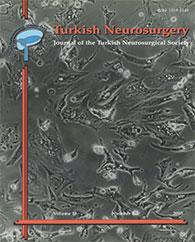2Hacettepe University, Faculty of Medicine, Department of Biochemistry, Ankara, Turkey Object: Free oxygen radicals play a major role in the pathophysiology of central nervous system (CNS) trauma, neurodegeneration and aging. Aminophylline, an antiasthmatic drug, was shown to exert some free radical scavenging effect on lung tissue. The purpose of this study was to investigate the free radical scavenging effect of aminophylline on CNS tissues. The antioxidant action of different doses of aminophylline was studied under oxidant conditions in vitro.
Methods: The whole rat brains and spinal cords obtained from male Wistar rats were homogenized in 1:10 cold potassium phosphate buffer by using a dounce homogenizer. Peroxidation was induced with ferrous iron (Fe++), ascorbate (Asc) and hydrogen peroxyde (H2O2). Aminophylline was added into the reaction mixtures just before the addition of lipid substrates. Thiobarbituric acid-reacting substances (TBARS) were measured as an index of lipid peroxidation.
Results: The highest lipid peroxidation was obtained with Fe++, Asc and H2O2 induced group. Addition of aminophylline showed no free radical scavenging effect on rat brain and spinal cords.
Conclusion: Analysis of the results demonstrated that aminophylline has no antioxidant effect on rat brain and spinal cord homogenates in vitro. Further in vitro and in vivo studies are needed to evaluate the free radical scavenging effect of aminophylline.
Keywords : Aminophylline, antioxidant, brain, lipid peroxidation, spinal cord




